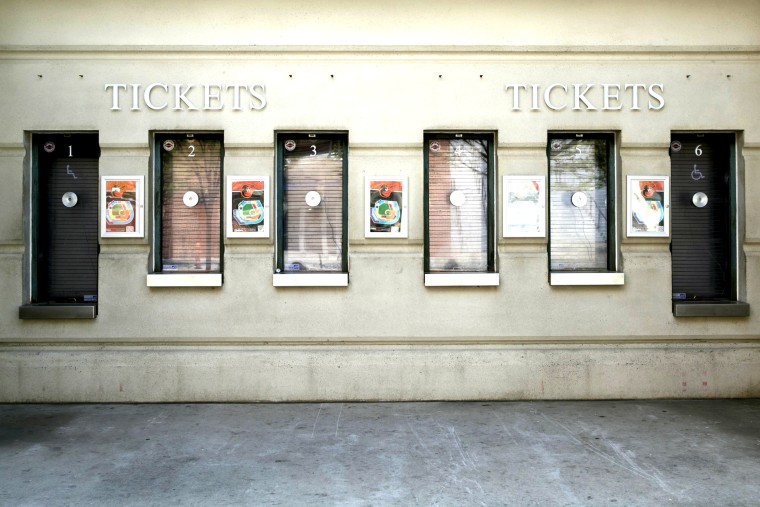The sun was out — perfect spring baseball weather. The scoreboard in right-center field lit up with the starting lineups. But it was so quiet at first pitch that you could hear the click of camera shutters.
And the fans were on the wrong side of the gates.
Their city still uneasy after a riot two days earlier, the Baltimore Orioles locked up their ballpark and played a game Wednesday with nobody in the stands. The low murmur of a weekday afternoon crowd was replaced with eerie silence.
“Baseball history will be made here today,” play-by-play broadcaster Gary Thorne said to the TV camera as he went on the air. But it wasn’t the kind of history anybody wanted to make.
Final score: Orioles 8, Chicago White Sox 2. Paid attendance: Zero.
Foul balls clattered into empty seats. TV viewers heard only the scattered encouraging shouts of players in the dugout. A first-inning home run by the Orioles’ Chris Davis was met with the muffled enthusiasm of a golf tournament.
“We need this game to be played,” Orioles outfielder Adam Jones told reporters before the game, “but we need the city to be healed first.”
Outside Oriole Park at Camden Yards, one of the game’s most beautiful venues, fans got as close as they could. They even managed to get a chant of “Let’s go O’s!” going.
"It was real nice to see people come out and support the team, even though they weren't actually allowed to go inside the game," Ryan Blake, 20, said outside the park's gates.
Major League Baseball had already canceled the first two games of the Orioles’ series with the White Sox. And the Orioles’ weekend series with the Tampa Bay Rays was moved to Florida.
Wednesday’s game was scheduled to be played under the lights, but the league moved it to the afternoon — a 10 p.m. curfew is in effect all week — and closed it to the public. The league’s official historian, John Thorn, said it had never happened before.
Rob Manfred, the commissioner of baseball, said that the decision was made “in the best interests of fan safety and the deployment of city resources.”
At a pregame press conference, Jones tried to encourage a healing city.
“My prayers have been out for all the fans, all the kids out there,” he said. “They’re hurting. And I think the big message is to stay strong, Baltimore. Stay safe. Continue to be the city, the great city, that I’ve grown to love over the last eight years.”

Thorn said on Twitter that a game in 1882 was played before six fans, and a minor-league game in 2002 was played without fans for five innings in an attempt to set a record. But Wednesday’s game was unique in major league history.
“I agree that Baltimore needs to get back to normal,” Dan Duquette, the Orioles’ executive vice president, told MSNBC. “But until they get back to normal, I think that the comfort of our fans and public safety are paramount concerns for the Orioles. And I think that we had to keep that in mind during this challenging time.”
Orioles fans could still watch the game on cable and hear it on radio, and Major League Baseball made the game free on its Internet service.
The Monday and Tuesday games will be made up in a May 28 doubleheader. Fans who had tickets to Wednesday’s game can exchange them for another.
For the weekend series with the Rays, in St. Petersburg, Florida, the Orioles will be treated as the home team and will bat last.
When Los Angeles erupted in riots in April 1992, following the acquittal of four police officers in the beating of Rodney King, the Dodgers postponed four games. That July, they played four doubleheaders in six days to make them up.
Riots in Detroit in 1967 forced the Tigers to move a series with the Orioles to Baltimore. And baseball postponed Opening Day by two days for the entire league in April 1968, after the assassination of Martin Luther King Jr.
There was rioting in Baltimore that month, but the Orioles only had to postpone one game. As The Baltimore Sun pointed out on Wednesday, two of their players missed the home opener because they were called up by the National Guard.
Thorn commended Major League Baseball and the Orioles for making public safety paramount, and he said that an empty stadium is a mere oddity compared with the gravity of what has happened in the city.
“It is so easy for us to focus on the effect, the baseball effect, of the Baltimore unrest, and thus give undue attention to the effect and not enough to the cause,” he told NBC News. “All of this pales.”